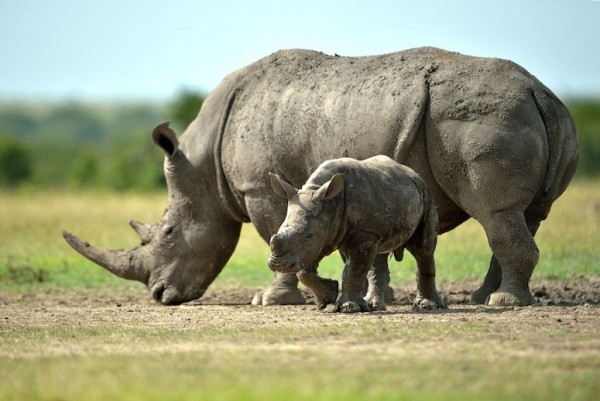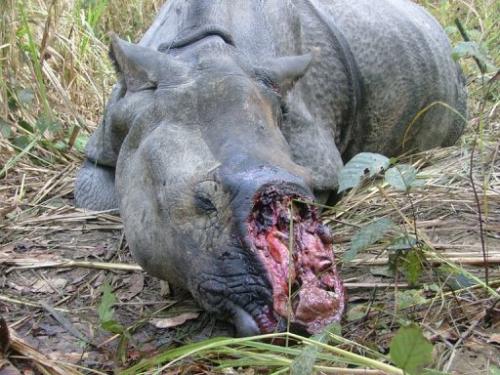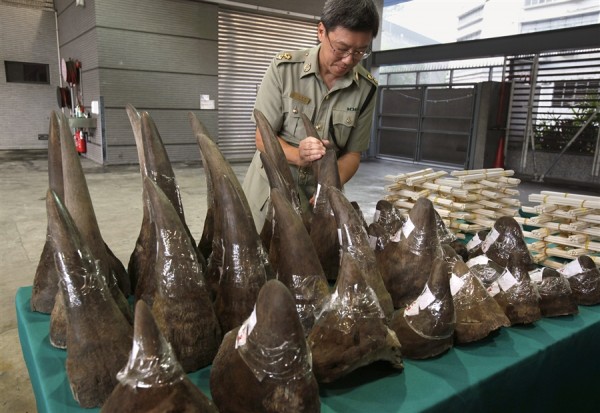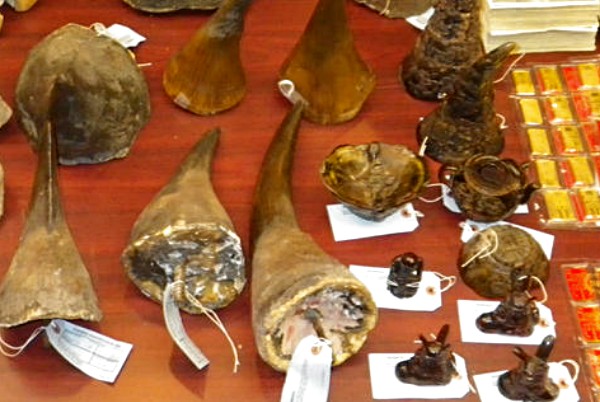
Poaching is a major problem facing the world as a whole. Poachers kill and destroy certain animals, endangering their species.
One of such endangered species is the rhinoceros. Often abbreviated simply as rhino, the animal is mercilessly hunted and killed by poachers wherever it lives. When poachers kill it, they remove the horns; the lucrative reason for why poachers hunt them.
Rhino horns are very popular in Asia, especially in China, Vietnam and Thailand; for its use in traditional medicines. The horns are consumed in powder form with the belief that it can treat everything from hangovers to cancer. Intact horns are also carved into decorative items such as jewelry.
Rhino horns are very expensive. According to monitors of the trade, one kilogram of rhino horns costs around $65,000. Due to the price and the high demand, it has become very difficult for countries to fight poaching.
Particularly for Africa, poaching has devastated the continent, threatening other animals such as giraffes, lions, tigers, elephants, and rhinos amongst others.
In South Africa for example, the number of rhinos killed by poachers jumped from 262 in 2008, to 1,215 in 2014. Recently, in the Democratic Republic of the Congo in Central Africa, it was reported that there are only 38 giraffe remaining at one of the country’s national parks, Garamba National Park.
Conservationists therefore, are calling for the ban of all products derived from endangered species. In the United States, the Endangered Species Act and the Rhinoceros and Tiger Conservation Act, make the commercial import, export, and interstate commerce of any products derived from rhinos, unlawful.
In light of these problems associated with poaching, a conservation-minded start-up company in the United States is growing rhino horns in the laboratory. The Seattle-based company, Pembient is one of the many companies in the United States developing synthetic rhino horns. The company said growing artificial horns in the laboratory, will discourage people from poaching.
According to the chief executive of Pembient, Matthew Markus, the company is growing the horns to drastically cut down the current market price. He said the idea is to bombard the market with fake rhino horns, which will drive down the price of a real horn, reducing the financial incentive for poachers to kill the animals. Markus also added that he hoped the synthetic horns would provide an outlet for consumers in the same way faux fur has done in the past.
But some environmental groups have disagreed with the work of Pembient and all other companies growing artificial rhino horns. They contended the synthetic version is not only illegal, but will also increase demand for real rhino horns.
To state their case officially, two environmental groups – the Center for Biological Diversity and WildAid – have filed a petition asking the United States Fish and Wildlife Service (FWS) to ban the import, export, and sale of ‘cultured’ rhinoceros horn.
“Pembient’s cultured rhino horn is a ‘product’ of ESA-listed…rhinoceros. To produce its cultured horn, Pembient will insert the rhinoceros gene sequence that codes for rhino keratin into yeast, which then multiplies. Accordingly, because Pembient’s synthetic rhino horn both is ‘produced from’ the rhinoceros genetic code and includes rhinoceros genetic material, and because the ESA prohibits the import, export, or sale of ‘any . . . product’ from an endangered animal, trade in cultured rhino horn is prohibited,” the petition said.
Take Part reports that FWS spokesperson has declined to comment on the petition. But FWS deputy assistant director in charge of law enforcement, Edward Grace shared the concerns of the petitioners in an email to Take Part.
“Experience demonstrates that efforts to ‘flood the market’ for products produced from protected wildlife…often fail to achieve their stated goal. Such efforts often create more demand from consumers,”Grace wrote. He also added that FWS worries that synthetic products would make it harder for law enforcement to detect poached and trafficked wildlife products, and will allow criminals to disguise the source of illegal products by co-mingling them with these alternatives.
You want to support Anonymous Independent & Investigative News? Please, follow us on Twitter: Follow @AnonymousNewsHQ
This article (The Big Question: Will Synthetic Rhino Horns Save the Species or Kill it Off?) is a free and open source. You have permission to republish this article under a Creative Commons license with attribution to the author and AnonHQ.com







